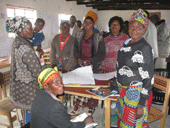Women-Africa: Funding tends to be “gender blind”
Published on Mon, 2011-05-09 09:15
Source: Women for Change, Zambia “Funding” of civil society organisations (CSOs) “at times tends to be gender blind since funding bodies’ composition mostly constitutes males, according 23 activists and experts from five countries and 17 institutions convened in Lusaka last month to discuss those issues. The “shrinking space” of African CSOs “has had negative impact” on the effectiveness of programs about gender issues in the continent, according to the participants. The meeting was held from 7th to 8th April within the framework of the Africa Region Consultations on Gender and Development, in turn part of the process of the Open Forum on CSO Development Effectiveness born last year in Istanbul by organisations all over the world. “Sharing the little resources to address all gender related needs” in the communities has a “negative impact” on their program’s effectiveness. There is a “need to ensure the gender issue does not get buried among the other principles but to be given prominence in order to allocate resources to the sector,” agreed the participants from Kenya, Mozambique, South Africa, Zambia and Zimbabwe. The activists and experts —under the facilitation of Zambian organisation Women for Change— welcomed that “most countries had signed to a number of instruments relating to gender and have gender policies and frameworks in place”, but warned that “implementation was still a challenge attributed mostly to the patriarchal structure of the society”. “To address this there is need to have guidelines that focus on the taking of affirmative action in as far as women participation is concerned,” according to the document of conclusions of the conference. “CSOs have different agendas even when they are working on gender thus focus is to be holistic in order not to disadvantage the mandate of specific organisations. In this sense, all the 8 Istanbul principles should be looked at using a gender lens,” it adds. The 23 activists and experts also asked the Open Forum “to ensure concerns of ‘small’ organisations are taken on board”. “The main focus of work done by CSOs in Africa are around social and economic empowerment programmes which include women’s and children’s rights, women’s participation, women health rights and HIV&AIDS and livelihood support. Therefore, there is need to ensure all the needs of the different CSOs are included,” they said. “However —adds the document— the CSOs agreed that there are some crosscutting issues that affect organisations whether women focused or mainstream organisations i.e. the vulnerable situation of women and girls exacerbated by the patriarchal nature of our societies. This would need to be addressed including cultural practices that have further placed women and girls at a disadvantage e.g. female genital mutilation and wife inheritance.” “Other issues of concern raised” in the meeting included “the ‘fear’ of calls for gender equality and equity as a result of misunderstanding the concept of gender by males who currently dominate the higher structures of decision making” and “the need for women to have access and control over resources including right to land”. “In addition, CSOs agreed on the fact that gender is viewed as a woman’s issue because so far it is an issue that is being led by women and for women, thus it is mostly linked to women and feminist movements. Consequently, there is need to package guidelines to be all inclusive in order to take on board economic, political, social and cultural aspects,” the participants concluded. CSOs were in agreement on the question of having an enabling environment for work around gender. They agreed that CSOs “do not have an enabling environment” to work on gender issues because “the lack of adequate policy frameworks” in African countries in general gives left them “vulnerable” and with “little control over the environments in which they operate” Read the complete document at http://bit.ly/k4tVZD
|
SUSCRIBE TO OUR NEWSLETTER



